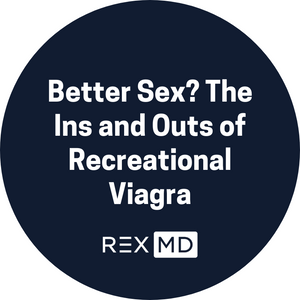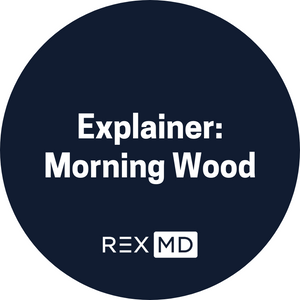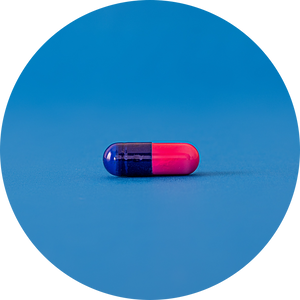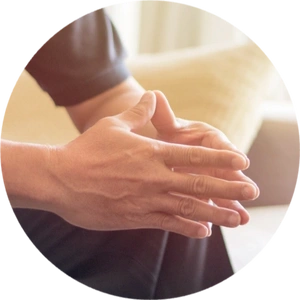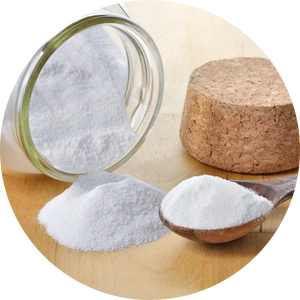Being nervous from time to time is totally normal.
But if you start feeling intense and excessive feelings of fear or panic, even when there isn’t a lot to be afraid of, it could be a sign of anxiety.
It’s estimated that nearly 40 million adults in the United States suffer from some kind of anxiety disorder, which can vary in severity, making it the most common diagnosed mental illness.
Several symptoms accompany anxiety disorders, and perhaps one of the most surprising is erectile dysfunction.
Prescription ED medications can help to reduce the symptoms and severity of erectile dysfunction caused by anxiety, but they won’t do much to relieve your anxiety.
Keep reading for more info on how counseling, lifestyle changes, and other treatment options can help you manage this challenging hand of cards.
What Is Anxiety?
There are a lot of misconceptions about anxiety and the various disorders categorized within it.
Anxiety might be thought of as the way that your body reacts when it encounters stress or danger. In evolutionary terms, it's basically your body’s warning system. Anxiety is trying to tell you that something is wrong about your situation.
While this reaction can be helpful in legitimately dangerous scenarios, it can be significantly invasive when the situation doesn't present real danger.
Eventually, these constant instances of anxiety or panic can start to have a negative effect on your physical, psychological, and sexual health.
What Are the Different Types of Anxiety?
Anxiety disorders can be broken down into five major types. Many have similar symptoms, but the differences are mostly related to what triggers them. The five major types of anxiety disorders include:
- Generalized Anxiety Disorder is when someone experiences chronic worry, discomfort, and nervousness despite there being minor or no issues provoking it.
- Panic Disorder is when unexpected, intense episodes of terror and fear are accompanied by symptoms like accelerated heart rate, shortness of breath, chest pain, dizziness, or stomach pain. Those with panic disorder may live in fear of the next panic attack.
- Post-Traumatic Stress Disorder typically develops after someone is exposed to a traumatic scenario that includes either grave physical harm or threat to life.
- Obsessive Compulsive Disorder is when a person is plagued by unwanted and recurring obsessive thoughts in addition to repetitive physical behaviors and compulsions.
- Social Anxiety Disorder is when a person experiences overwhelming self consciousness in normal or everyday social situations and interactions with others, often feeling very low self-esteem or that they are constantly being judged.
How Does Anxiety Impact Erections?
The process of achieving an erection is complicated and requires several physiological systems performing efficiently.
Even a minor disruption in this delicate chain of events can make it challenging to get an erection or keep it for long. Anxiety affects your body and mind in a few ways and can have a negative impact on the erection process.
For starters, anxiety disorders can affect your sexual desire and libido. It’s hard to get “in the mood” when you're worrying about something else going on in your life.
Another issue with anxiety is related to the mental arousal process. Your brain sends neurotransmitters into the blood vessels and muscles of your penis. These chemical messengers are responsible for expanding your blood vessels and relaxing muscles in order to allow more blood to flow into the penis and create an erection. The penis needs multiple times its usual volume of blood to achieve an erection. Quality blood flow is key to this process.
One common side effect of anxiety is an imbalance of these hormones and neurotransmitters. A hormone imbalance can both block and disrupt the chemical messengers required to create an erection.
Perhaps the most difficult part of anxiety is that it can be cyclical. Having anxiety makes it more difficult to achieve an erection, which can hinder sexual performance. This experience can then lead to developing performance anxiety around sex, which can increase your overall anxiety and make the symptoms of ED even worse.
How Do You Treat Erectile Dysfunction Caused By Anxiety?
The good news is that both erectile dysfunction and anxiety are common experiences, so there's substantial research and information about both.
These are some steps you can take to help with sexual dysfunction relating to anxiety:
- Determine the cause of your erectile dysfunction. It’s possible that your anxiety might not have anything to do with your erectile dysfunction. In most cases, erectile dysfunction is the result of a physical condition that affects your blood circulation and/or cardiovascular system. Visiting a doctor can help you determine if the difficulties are the result of an underlying physical condition.
- Reduce the triggers of your anxiety. Even if your erectile dysfunction is caused by a physical issue, your anxiety isn’t helping. You should start trying to figure out what exactly causes you to experience anxiety and which of the five major anxiety disorder types best fits your symptoms. Once you know what causes your anxiety, it will be easier to avoid or address these triggers in the future.
- Get prescription medication for erectile dysfunction. The easiest way to manage the symptoms of erectile dysfunction is to use prescription ED medication such as Viagra®, Cialis®, or Levitra®. Each of these drugs work to improve blood flow to your penis and can make it easier to achieve and maintain erections. You can discuss your options while getting checked out by your family doctor, or by using an online men’s telehealth service.
- Talk with a therapist about your anxiety. Talking with a therapist might help you to determine the causes of your anxiety and work through the issue. At the very least, a good therapist will be able to teach you some treatment techniques such as breathing exercises, yoga, or meditation, as well as work with you on reframing your thoughts and better managing anxiety when it emerges.
The Takeaway
Anxiety can have a significant impact on sex. The worst part is that these issues often lead to more anxiety in the future that will make sex even more challenging. These two stressors can then fuel each other in a cyclical, negative way.
The best way to address the issue is to handle it on two fronts.
First, addressing the causes of your anxiety or learning to treat anxiety when it arises are key. Visiting a therapist can help you to better understand what you're experiencing and why it’s happening. You can also learn techniques to help you get your anxiety under control.
The second thing is to consider a prescription ED medication that will help you with your erectile dysfunction in the meantime.
These medications help most men achieve and maintain an erection, one step that can help to diminish performance anxiety and possibly cut the cycle of anxiety-to-ED.
Sources
What are the five major types of anxiety disorders? | HHS
Physiology, Erection - StatPearls | NHS
The Relationship Between Anxiety Disorders and Sexual Dysfunction | Psychiatric Times
The Neurobiology of Anxiety Disorders: Brain Imaging, Genetics, and Psychoneuroendocrinology | NIH
Sexual Performance Anxiety | PubMed





